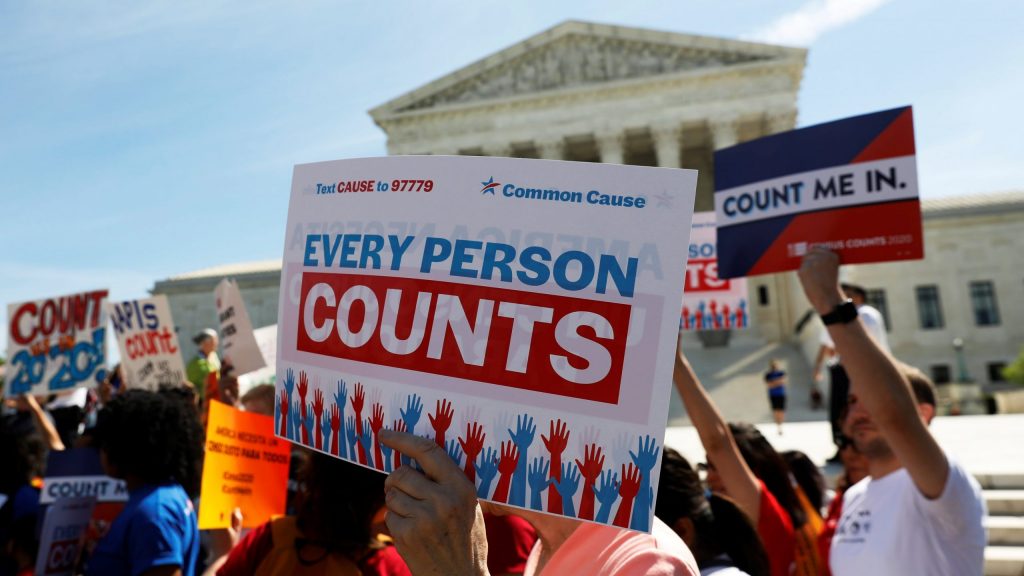A panel of federal judges said President Donald Trump acted unlawfully with his order this summer to exclude immigrants without legal documentation from being counted in the 2020 census for the redrawing of congressional districts.
The federal judges in New York granted an injunction on the order Sept. 10, prohibiting Commerce Secretary Wilbur Ross, who oversees the U.S. Census Bureau, from following the president's July 21 memorandum.
The panel said Trump's order violated laws about how the census is conducted and the process for redrawing congressional districts based on census numbers, emphasizing that people in the United States illegally qualify to be counted in the states where they live.
"Throughout the nation's history, the figures used to determine the apportionment of Congress -- in the language of the current statutes, the 'total population' and the 'whole number of persons' in each state -- have included every person residing in the United States at the time of the census, whether citizen or noncitizen and whether living here with legal status or without," the judges said.
Democratic leaders, the U.S. Conference of Catholic Bishops and immigration advocates took issue with the president's memorandum on the census and predicted that it would meet legal challenges and would not likely become policy.
Many also questioned how the administration would accurately go about determining how many people to exclude from data used to redraw congressional districts.
A July 22 statement issued by the chairmen of two USCCB committees described the president's memo as "simply wrong and divisive." They urged Trump to rescind it and instead make "efforts to protect and heal our nation and all who are living in our country."
"As we have stated before, we urge all people to be counted and fully included in the census," said the statement issued by Archbishop Paul S. Coakley of Oklahoma City, chairman of the Committee on Domestic Justice and Human Development, and Auxiliary Bishop Mario E. Dorsonville of Washington, chairman of the Committee on Migration.
"Counting the undocumented in the census and then denying them and the states in which they reside their rightful representation in Congress is counter to the Constitution and a grave injustice," they said, adding that the policy also "makes people feel invisible and not valued as human beings."
"This is nothing but an unconstitutional and xenophobic attempt to weaponize the census to silence and scare immigrants. The immigrant community will not be silenced," tweeted Cabrini Immigrant Services of New York City July 21.
The Hope Border Institute tweeted: "The Constitution says the Census must count everyone, no exceptions." It also said on Twitter that the "Trump administration's illegal attempt to politicize the #Census and do an end run around the Constitution to exclude certain folks would mean overlooking 1.6 million folks in Texas alone and the financial impact to the state would be incalculable."
The president said excluding "illegal aliens" from the 2020 census "reflects a better understanding of the Constitution and is consistent with the principles of our representative democracy."
His memorandum went on to say: "My administration will not support giving congressional representation to aliens who enter or remain in the country unlawfully, because doing so would create perverse incentives and undermine our system of government."
"Just as we do not give political power to people who are here temporarily, we should not give political power to people who should not be here at all," it said.
The Census Bureau announced in June that more than 90 million households had already responded to the census, primarily online. Prior to sending out this year's forms, the agency called on religious leaders around the country to spread the word about the count and to encourage participation in it to ensure that all communities benefited from an accurate count.
Last year, the Supreme Court blocked the administration's attempt to add a citizenship question to the 2020 census, saying the reason given for adding the question -- to help enforce voting rights -- seemed contrived.
U.S. bishops praised the court's action, saying: "All persons in the United States should be counted in the census regardless of their immigration status." They also reiterated a previous bishops' statement on the issue that said: "questions regarding citizenship should not be included in the census. We hope that this view will prevail, whether by administrative action or judicial determination."
The census is rooted in the text of the Constitution, which requires an "actual enumeration" of the population every 10 years. It determines federal funding for roads and schools and provides population numbers for redrawing congressional district boundaries and determining how many House representatives each state gets.

